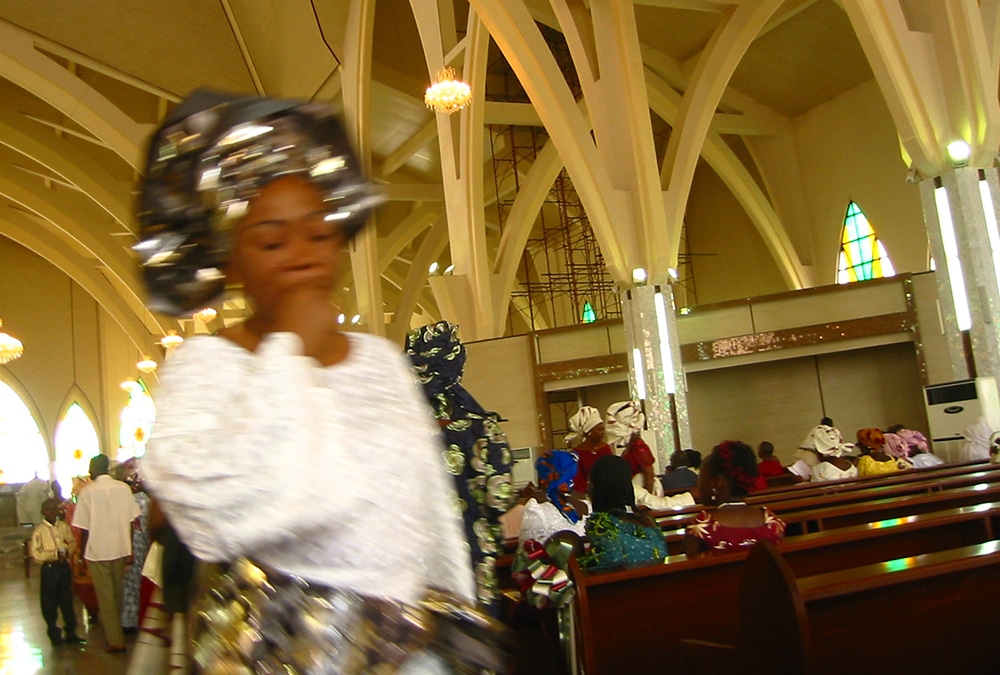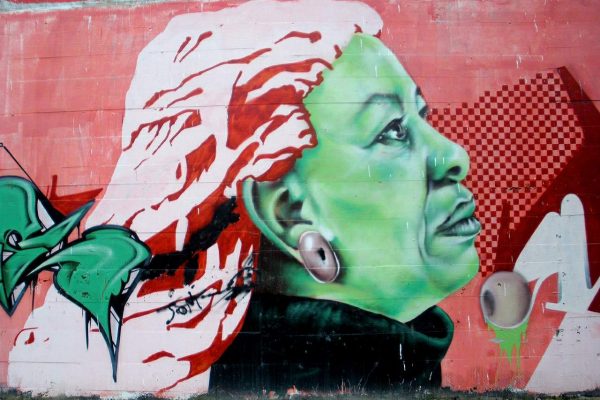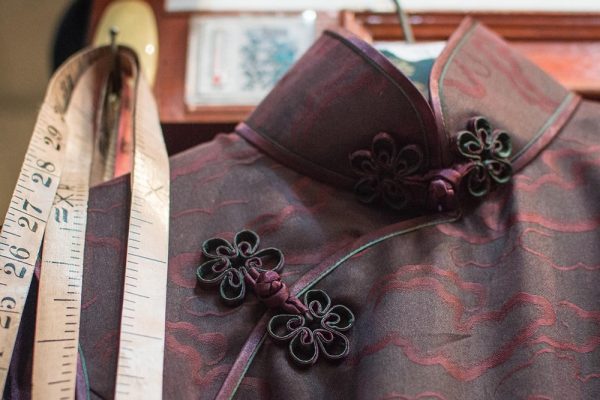Theresa has disappeared. She disappeared on an ordinary Sunday afternoon. That day, we saw her at Mass, didn’t we? We saw her and Mary-Ann, her daughter. She had on an orange lacy blouse with high puffed sleeves and a two-piece leaf-green george wrapper, dotted with glittery beads. Mary-Ann also wore an orange and green glittery flared gown. The rest of us, in our dull old wrappers and blouses, dimmed around them. We stayed away from them like we always do. Even during the peace greetings, we did not shake hands with Theresa and her daughter. At the end of Mass, when the priest said, “The mass is ended, go in peace,” Theresa held Mary-Ann’s hands and they walked through the center aisle. They could have gone out through any of the four side doors, but Theresa wanted to show off her clothes and her earrings and shoes. They went ahead of us as we all walked home. The last time we saw Theresa, she was entering into her flat with her daughter. That was what we told the four policemen who came to investigate the missing person report Theresa’s mother had filed one week after Theresa disappeared.
Four policemen drove into our village in a jalopy truck. We welcomed them and when they asked us about Theresa, we told them what we knew. No, we didn’t tell them what we knew. We answered their question, the same question they asked eight-year-old Mary-Ann: “When was the last time you saw your mother?”
“We went to church together,” Mary-Ann started. “After church, we returned home. My mummy cooked Sunday rice and stew.”
“And so?” one policeman said, looking around as if we were hiding the rice and stew from him.
“Me and my mummy ate, then we slept. When I woke up, my mummy told me to go and play in Aunty Ruth’s house. I came back from Aunty Ruth’s, our door was locked and I didn’t see my mummy again,” Mary-Ann concluded, opening her small palms.
We gathered behind the policemen as they listened to the same story Mary-Ann had told us. From where we stood, we wanted to pinch the policemen, to prod them, or whisper in their ears, “Ask her what happened when her grandmother visited last Sunday afternoon.” But we were too afraid to nudge the policemen. Fear weighed down on our tongues, and none of us was brave enough to spit out the weight. Is it everything the eye sees that the mouth can say, is it?
On the Sunday before Theresa disappeared, we closed our stalls early because the weather was very hot. We hide from the heat inside our houses, and since it was almost evening, we began to prepare to cook dinner. We were in our kitchens, slicing vegetables and peppers, when we heard Theresa screaming, again. Our days are not complete in this village without Theresa’s thin, loud voice piercing our ears. That Sunday, most of us ignored Theresa’s screams. We were busy, slicing our vegetables and peppers. But Theresa kept shouting and throwing things. One door opened; another window opened. We dropped the knives and trays, got up from our kitchen stools and saw what our eyes should not have seen: Theresa kicking her mother-in-law, Igede, on the ground. We ran out of our houses and dragged Theresa away from Igede. We picked the old woman up, using our scarfs and wrappers to remove sand from her back and the wrinkles and folds of her neck. Then we stood back with our hearts beating, hands shaking, lips quivering, and watched the old woman limp to her house at the other end of the village.
In our village, after God and his son Jesus, Igede is next. The same Igede that Theresa kicked on the ground. Igede, our medicine woman, our village seer and healer. There’s no problem Igede cannot solve. When we want to have our babies, we don’t go to the white people’s hospitals. We go to Igede. There are leaves she plucks from her backyard and boils for us to drink. We drink the medicine, immediately, before we even blink, the baby slides out. The one woman in this village who thought she was too holy to drink Igede’s medicine went to the hospital and what happened to her? The doctors cut her stomach open to bring out the baby.
We became true believers the day a rich person from the city brought a man that had been in a bad accident to Igede. The man’s legs were crushed, cracked pieces of bones shot out of one leg. With our own eyes, we saw Igede holding that leg and humming a song, chanting with her eyes closed. She plucked some leaves and squeezed the juice on the man’s legs. The next time we saw the man, three days later, he was walking with his own legs. Igede even wrestles evil spirits and sends them back to hellfire. People with big cars from the city visit our village to see Igede. And these people buy cold pure water, biscuits, and food from us. In this our village, after God and his son Jesus, Igede is next.
So, can you imagine how shocked we were when we saw Theresa kicking Igede on the ground? We spied each other from the corner of our eyes. Something was coming. There was a steady hum in our village, like electricity hissing through wires. When we breathed deeply, we tasted the something on our tongues. Something was coming. We didn’t know what, so we waited. We were still waiting when the policemen came one week later and said they were looking for Theresa.
“Who is Aunty Ruth?” a policeman asked Mary-Ann.
We sighed. We shook our heads. The police were still asking stupid questions.
“Aunty Ruth is my daddy’s sister,” Mary-Ann said.
“Where is your daddy?”
“He went to work.”
“When will he come back?”
Mary-Ann opened her small palms. “I don’t know.”
“Come and show us your auntie’s house.”
We walked behind the policemen and Mary-Ann to Ruth’s house.
Ruth was Solomon’s sister, his twin sister. Our elderly parents said when Ruth and Solomon were little babies, they held each other’s hands, that if you took one from the other, they would both cry. Ruth had always taken care of Solomon since they were children. She loved him more than her own children.
But who wouldn’t love such a brother? Wasn’t Solomon the one who gave her money to set up her shop? Wasn’t he the one who bought two large deep freezers and a generator for her? People flocked to Ruth’s because her drinks were always ice cold. Before Solomon married Theresa, Ruth would go to his house to collect his dirty clothes on Friday. She would return them on Sunday, fresh, crisp, and folded along with bowls of soup and stew. Ruth took care of Solomon like she did her six children and her husband who spent his day smoking and drinking her cold beers.
As they both got older, Ruth decided to find a wife for her brother. She wanted the best of the best for him. A woman who would care for him like she did. When we heard that Ruth was looking for a wife for her brother, we sent our daughters to her. We begged her to send them to collect Solomon’s dirty clothes and deliver soups to him. Some of us bribed Ruth. One woman said she’d sew Ruth’s clothes for free; another woman said she’d give Ruth’s children free ice cream. Whatever we had, we offered Ruth. Week after week, we waited, we hoped. Solomon met our daughters, he treated them like he always did. He smiled, said hello, took whatever they brought him and shut his door. We begged Ruth to keep sending them, maybe one day, Solomon would like one. But Ruth said she wanted to be fair and give her brother a chance to choose from all the girls in the village. That was how she sent Theresa to Solomon, and, for that, we’ll never forgive Ruth. Solomon met Theresa once. Three weeks later, he took wine to her father.
Ah, Solomon. He was the husband we dreamed of marrying when we were girls. He didn’t smoke, drink beer, or use snuff. He didn’t sit with jobless men under the mango tree playing draft all day. Solomon was quiet and minded his business. On weekends, when he wasn’t at work, we’d see him in Ruth’s shop, playing with her children and helping Ruth to serve her customers. A man like Solomon, working in his sister’s shop as if he were a common man.
Solomon had a real job in the city. He drove staff of the oil company—white men, rich important men!
In the morning, Solomon would come out in his uniform—black trouser, white shirt, black tie—that Ruth had washed and ironed for him, with his hair well oiled and combed. The early morning sun would shine on his polished shoes. Other men would have raised their shoulders and looked down their noses at us, but not Solomon. He greeted us, smiled and waved at us as he drove the oil company’s Hilux truck to the city. Sometimes Solomon had to stay at work for several weeks. At the end of those long stretches, he would return with food that white people said had expired. How can food that God created expire? Solomon shared with us the small bags of rice and bottles of vegetable oil, dozens of corned beefs, tins of sardines, and pork belly and chicken feet. All of that could have come to us if he had married one of our daughters. We’ll never forgive Ruth for sending Theresa to Solomon.
Theresa had not been Ruth’s first, second or even tenth choice for her brother. She sent Theresa to him so that people won’t say she was being partial. Serves her right, though. If only she had listened to us. There was something odd about that Theresa. She thin and dry like bonga fish. Her skin was different too. It was as though when she was born, she couldn’t decide if she wanted to be an albino or have black skin like the rest of us. She was stuck somewhere in-between with reddish-brown freckled skin and wide eyes with very dark eyeballs.
Solomon’s choice had broken Ruth’s heart. We could tell because Ruth was one of us and our hearts were broken too. But Ruth hid her disappointment; she tucked it in the way we hide money in the drawstring purses under our wrappers. We had hoped that if Ruth told Solomon that she doesn’t like Theresa, then maybe one of our daughters would catch Solomon’s eyes. But Ruth told us that her brother’s happiness was her happiness. If he likes Theresa, then she, too, likes Theresa.
When Solomon decided to marry her, he didn’t even consult Igede, his own mother, before he took wine to Theresa’s father. In our village, after God and his son Jesus, Igede is next. If we want to travel, we ask Igede to check that the road is not thirsty for human blood. If we want to plant, we wait for her to read the skies, lick the soil, and tell us when it is right to plant. Yet Solomon married a strange girl like Theresa without consulting his mother. Young people of these days, they think they know everything.
Now do you understand why we were shocked when Theresa pushed Igede out of her own son’s house and kicked her on the ground? Do you understand why our lips started shaking, why our hearts almost jumped out of our chests? We whispered in the kitchen, in the market, inside our houses. We whispered and waited. There was only one question on our lips: Would Igede forgive Theresa because she bore her a grandchild?
The policemen went to Ruth’s house, where the veranda had been converted into a beer parlor. We met her pouring beer into glasses for two men. Ruth welcomed the policemen. She brought out plastic chairs and set them around a table covered with a white flowery tablecloth. The policemen sat and Ruth gave them one bottle of cold beer each. She went into her kitchen and served them her Sunday rice and stew. The policemen dropped their batons instantly. Then they asked Ruth the same stupid question: “When was the last time you saw your sister-in-law?”
“Two Sundays ago,” Ruth said. “Theresa had a quarrel with my mother, I went to ask her what had happened.”
“So, what happened? What did Theresa say?” one policeman asked, stew leaking from the corner of his stuffed mouth.
Ruth opened her palms as Mary-Ann had done. “I don’t know. Theresa didn’t say anything to me. She laid on the bed looking at the wall. Mary-Ann stayed here with me until her father returned from work.”
“Where’s the father now? At what time does he return?”
“Maybe today or tomorrow,” Ruth said. “He has been on a one-week shift.”
“That means he doesn’t know his wife is missing?”
Ruth nodded.
When Theresa was about ten years old, her younger brother annoyed her and she slashed his face with a knife. The thick scar is still on his face to remind us. If our children laughed at her, and called her “Miss Red Skin” at school, Theresa would beat them and tear their uniforms and books. As Theresa got older, she stopped fighting, but she didn’t have any friends. When the girls lined up at the bore hole to fetch water, Theresa would not talk to them. She folded her arms and stood away from them. When out running errands, she didn’t greet anyone or smile at anyone. If there was nothing for her to do, she would sit outside on the veranda talking to herself. Then, she would vanish for months and no one would see even her shadow.
A woman who lived close to Theresa’s parents told us that during the times when we didn’t see Theresa, she was in her parents’ house, locked inside a room. The woman said there were days Theresa woke up with blank eyes, that her eyeballs would stand still, not moving, as though the life in them had fallen down inside of her head. That on days like that, Theresa wouldn’t remember her own name, that she would talk to people only she could see. The woman told us that, sometimes, Theresa fought with the people only she could see and broke things around the house. She told us that, one day, Theresa’s condition got so bad that her father and brother tied her with a rope.
We don’t like Theresa’s mother much because she feels she’s above joining our women’s group in the church and our market union, but we felt a little pity for her then. If people had found out that not only was Theresa’s skin strange, but something was also wrong with her, nobody would marry Theresa. Didn’t we all see how happy and relieved Theresa’s mother was the day Solomon paid Theresa’s bride price? Didn’t we see joy and happiness dancing in her mother’s eyes and how she couldn’t stop smiling weeks after the wedding?
For a while after Mary-Ann was born, Theresa would actually greet us as she walked about the village with Mary-Ann tied to her back, mellow and quiet. But after Mary-Ann’s first birthday, Theresa started to quarrel and fight with herself. One day, Solomon returned from work earlier than expected. We saw his truck and wondered. We followed him with our eyes until he stopped and parked the truck in front of his house. Two women came out of the truck, one was black like us and the other one was white, a proper oyibo. They were doctors, we saw their long white coats.
Ah, we have never seen a white woman with our own eyes before, or even a black woman doctor. In the general hospital near our village, it is only man doctors and woman nurses. We ran out of our stalls to look at them. The doctors went into the house with Solomon and when they came out, the white doctor was holding Theresa. A white woman touched that Theresa. If Theresa were our friend, we would have asked her how the white woman’s hands felt, if they were like our hands. The doctors, Theresa, and Solomon got into the truck and left. Ruth came out of the house with Mary-Ann, she locked the door, and took Mary-Ann to her house.
We didn’t see Theresa for a whole month. Then she returned, she was different. The Theresa that left our village was not the Theresa that returned. This new Theresa smiled. She greeted us in the market. She joined our women’s group in church. She played with our children. We wanted to like her; we tried. But how could we when Solomon bought her new laces and wrappers that she wore to church every Sunday? How could we when, on Saturdays, Solomon would take her and his daughter to the city with the oil company truck, and they would return with fried rice and fat, fat chicken? Sometimes they brought meat pies and ice cream, and Solomon would share with our children.
All that could have been ours. Theresa had stolen the life we desired, and it pained us. It pained us especially that a strange girl like Theresa, a girl nobody would even look at twice, had done that to us. Sister Agnes sells food in the city, and she told us that it was because of Theresa’s skin that Solomon married her. She told us that, in the city, girls were thin and that they all had yellow or red skin like Theresa. Even the ones that she knew had black skin changed to yellow before her eyes.
The Sunday after Sister Agnes told us about the city girls, we looked away from Theresa’s clothes long enough to look at Theresa and saw—how had we not seen before that day?—how tall she was, how her skin shone like red gold in the sun, and her body, so perfect. The kind of woman God molded on a Sunday.
The policemen stretched their legs as they drank Ruth’s beer. They weren’t even asking questions anymore. Gathered outside the shop, we wanted to pinch the policemen, to prod them, or whisper in their ears, “Ask Ruth to explain who her mother is.”
Just then, we saw Solomon’s truck driving toward us, Theresa’s mother in the passenger seat. Solomon parked in front of Ruth’s shop. He stretched his neck and looked past Ruth and the policemen into the shop. He didn’t even greet us.
“Where is Theresa? Where did she go?”
Mary-Ann came out of the shop when she heard her father’s voice.
“Daddy, daddy,” she sang as she ran to Solomon and he picked her up.
Theresa’s mother’s eyes were red. We felt a little pity for her. She had been looking for Theresa everywhere. She even paid the policemen to come and help her find Theresa. If she had been our friend, we would have told her that, last Sunday, her daughter pushed Igede and kicked her on the ground.
“Where is Theresa?” Solomon asked again. He looked around as if we were hiding his wife.
“That is why we are here,” one policeman said and belched. He pointed to Theresa’s mother. “She came to tell us this morning that Theresa has been missing for one week. One whole week. If we’d received a report immediately, or even the next day, we could have searched for her.”
Solomon lowered Mary-Ann to the ground, he sat down. He covered his face with his hands. If he were not a man, he would have cried there and then. It was then Solomon told us that Theresa had a sickness that made her hear voices in her head. He said the voices made Theresa upset. He called the sickness one name that we cannot pronounce. Theresa’s mother stood beside Solomon, nodding to what he was saying and wiping her eyes with the edge of her wrapper.
“I don’t understand the sickness,” Solomon went on. “One day, when I was driving some engineers to an oil rig, they asked me about my wife and daughter. I told them about Theresa, I told them everything. They said it was a sickness and there’s medicine that can stop Theresa from seeing people and hearing voices inside her head.”
As Solomon spoke, we remembered what that woman told us years ago about Theresa’s family. We remembered, too, the day the doctors came to carry Theresa and that it was a different Theresa that returned. But all that aside, what was Solomon really talking about? Was it the voices Theresa heard that made her kick Igede? How could Solomon and Ruth, especially Ruth, not see why Theresa had disappeared? One Sunday, Theresa threw Igede to the ground and kicked her. The next Sunday, Theresa disappeared. It was simple, straightforward. But Ruth remained quiet. Then, Solomon got up and said he was going to drive around and look for Theresa. After he left, the policemen got up too.
“Give us a picture of the girl,” one of them said.
Ruth went into her house and brought out a family photo album. But Theresa was not in any of the photographs. Everywhere Theresa had been was blank, as if she had faded into the background. Ruth went inside and brought more pictures, no Theresa. We ran into our houses and dug out our women’s group photographs, no Theresa. The large wooden framed picture of Solomon and Theresa on their wedding day, where Theresa sat on Solomon’s thigh, had only Solomon smiling at the camera. Pictures where Theresa had carried Mary-Ann had only Mary-Ann floating midair. Theresa, completely, disappeared. The something we had been waiting for had happened. A something we will talk about for the rest of our lives. Theresa’s mother fell to the ground. Anytime we think about that day, we can still hear her scream, her raw muted cry.
The policemen told us we were all mad in our village. “When you people find a picture of this missing woman, bring it to our station.” We wanted to call them to a corner, to whisper in their ears and tell them about Igede but they jumped into their jalopy truck and drove off leaving black smoke everywhere.
When the policemen left, Ruth picked up their empty bottles of beer and put them into crates. She took a napkin and began to clean the table. As if her sister in-law had not completely vanished! We never saw Theresa again, except for the traces of herself she left in Mary-Ann, who was thin and tall and had the same reddish-brown skin and bright wide eyes.








